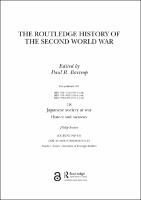Chapter 18 Japanese society at war
Proposal review
History and memory
Abstract
Chapter 18: This chapter presents how the war was experienced on the home front in Japan, and how that experience is remembered today. Taking an elongated periodization of the Second World War from the Manchurian Incident of 1931 to the end of the Tokyo Trials in 1948, it discusses the Japanese war experience in three main phases: early victories (to 1942); the tide turns (to 1945); and repatriations and reckonings (to 1948). The key ways in which the war affected the lives of civilians will be discussed, including war work, conscription, settler life, civilians in the battle zone (Okinawa, Karafuto), air raids, repatriation, and the struggle for survival post-defeat. By continuing the discussion up to the end of the Tokyo Trials, the chapter presents the mechanisms by which narratives of Japanese civilian victimhood became so prominent in Japanese memories of the conflict by discussing how Japanese war guilt was addressed at the Trials and beyond. Finally, the chapter discusses the contemporary representation of the civilian experience in Japanese war and peace museums.
Keywords
home front; Imperial Japan; military history; World War IIDOI
10.4324/9780429455353-23ISBN
9781138317086, 9781032113104, 9780429455353Publisher
Taylor & FrancisPublisher website
https://taylorandfrancis.com/Publication date and place
2021Imprint
RoutledgeClassification
History
Second World War
Modern warfare
c 1938 to c 1946 (World War Two period)
General and world history


 Download
Download